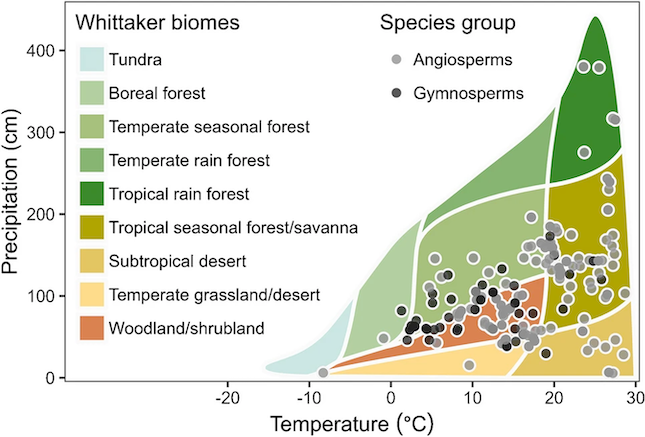PhD project offered by the IMPRS-gBGC in July 2025
Bioclimatic Shifts of Vegetation and Their Role in Past and Future Climate Change |
|
Alexander J. Winkler,
Christian Reimers,
Christine Römermann
|
Project descriptionThis project explores whether global vegetation shifts are a dominant force driving the land carbon sink, which currently absorbs about 30% of anthropogenic carbon emissions and mitigates climate change. While Earth system models mainly attribute this sink to CO2 fertilization—a mechanism whose magnitude remains debated—future climate projections heavily depend on its persistence (Arora et al., 2020). However, vegetation dynamics—the way plant communities shift in response to climate—play a crucial and often overlooked role in long-term climate carbon cycle dynamics: Vegetation is adapted to local environmental conditions, but as climate changes, biomes shift in response to altered key regulators, e.g., temperature and precipitation (Figure). These shifts can take decades or even centuries to fully manifest within the carbon cycle and climate system, meaning that current land-surface and climate models may significantly underestimate the long-term influence of vegetation dynamics (Winkler et al., 2024).This PhD project tackles this gap by pursuing three main avenues: First, we will revisit how vegetation dynamics are currently represented—or underrepresented—in climate models, leveraging unique simulations from the MPI Earth System Model, one of the few models that allows for explicit dynamic vegetation simulation. Specifically, will assess the impact of vegetation changes within a coupled system using established climate-carbon feedback frameworks (Friedlingstein et al., 2003). Second, we will push vegetation modeling to the next level by combining remote sensing, trait databases, and ecological theory with techniques such as space-for-time substitution (Lovell et al., 2023), impulse response functions, cellular automata, and machine learning, thereby capturing the delayed responses of vegetation to bioclimatic changes. Ultimately, we will implement these new approaches within fully coupled climate models, in collaboration within the MC3 (Max-Planck Carnegie Columbia Caltech) Center 4 Earth, to better understand the role of vegetation shifts in recent and future carbon uptake and to critically assess potential future climate outcomes. Working group and planned collaborationsThe successful PhD candidate will work in the Atmosphere-Biosphere Coupling, Climate and Causality group of the Department of Biogeochemical Integration at the Max Planck Institute for Biogeochemistry. The PhD candidate will benefit from the European Lab for Learning and Intelligent Systems (ELLIS) and will work closely with the ELLIS Unit Jena. Further, the PhD will benefit from and affiliated with the Max-Planck Caltech Carnegie Columbia (MC3) Center.Your profileThe ideal candidate has the following qualifications:
ReferencesArora, V.K., Katavouta, A., Williams, R.G., Jones, C.D., Brovkin, …, Ziehn, T., 2020. Carbon–concentration and carbon–climate feedbacks in CMIP6 models and their comparison to CMIP5 models. Biogeosciences 17, 4173–4222. https://doi.org/10.5194/bg-17-4173-2020Friedlingstein, P., Dufresne, J.-L., Cox, P.M., Rayner, P., 2003. How positive is the feedback between climate change and the carbon cycle? Tellus B 55, 692–700. https://doi.org/10.1034/j.1600-0889.2003.01461.x Lovell, R.S.L., Collins, S., Martin, S.H., Pigot, A.L., Phillimore, A.B., 2023. Space-for-time substitutions in climate change ecology and evolution. Biological Reviews 98, 2243–2270. https://doi.org/10.1111/brv.13004 Winkler, A.J., Myneni, R., Reimers, C., Reichstein, M., Brovkin, V., 2024. Carbon system state determines warming potential of emissions. PLOS ONE 19, e0306128. https://doi.org/10.1371/journal.pone.0306128  |